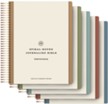Isaiah 15
English Standard Version
An Oracle Concerning Moab
15 An (A)oracle concerning (B)Moab.
Because (C)Ar of Moab is laid waste in a night,
Moab is undone;
because (D)Kir of Moab is laid waste in a night,
Moab is undone.
2 He has gone up to the temple,[a] and to (E)Dibon,
to the high places[b] to weep;
over (F)Nebo and over (G)Medeba
Moab (H)wails.
On every head is (I)baldness;
every beard is shorn;
3 in the streets they wear sackcloth;
on the housetops and in the squares
everyone wails and melts in tears.
4 (J)Heshbon and (K)Elealeh cry out;
their voice is heard as far as (L)Jahaz;
therefore the armed men of Moab cry aloud;
his soul trembles.
5 My heart cries out for Moab;
her fugitives flee to Zoar,
to (M)Eglath-shelishiyah.
For at the (N)ascent of Luhith
they go up weeping;
on the road to (O)Horonaim
they raise a cry of destruction;
6 the waters of (P)Nimrim
are a desolation;
the grass is withered, the vegetation fails,
the greenery is no more.
7 (Q)Therefore the abundance they have gained
and what they have laid up
they carry away
over the Brook of the Willows.
8 For a cry has gone
around the land of Moab;
her wailing reaches to Eglaim;
her wailing reaches to Beer-elim.
9 For the waters of (R)Dibon[c] are full of blood;
for I will bring upon Dibon even more,
(S)a lion for those of Moab who escape,
for the remnant of the land.
Footnotes
- Isaiah 15:2 Hebrew the house
- Isaiah 15:2 Or temple, even Dibon to the high places
- Isaiah 15:9 Dead Sea Scroll, Vulgate (compare Syriac); Masoretic Text Dimon; twice in this verse
Amos 8:1-12
English Standard Version
The Coming Day of Bitter Mourning
8 (A)This is what the Lord God showed me: behold, a basket of summer fruit. 2 And he said, (B)“Amos, what do you see?” And I said, (C)“A basket of summer fruit.” Then the Lord said to me,
(D)“The end[a] has come upon my people Israel;
I will never again pass by them.
3 (E)The songs of the temple[b] (F)shall become wailings[c] in that day,”
declares the Lord God.
(G)“So many dead bodies!”
“They are thrown everywhere!”
(H)“Silence!”
4 Hear this, (I)you who trample on the needy
and bring the poor of the land to an end,
5 saying, “When will (J)the new moon be over,
that we may sell grain?
And (K)the Sabbath,
that we may offer wheat for sale,
that we may make (L)the ephah small and the shekel[d] great
and deal deceitfully with false balances,
6 that we may buy the poor for (M)silver
and the needy for a pair of sandals
and sell the chaff of the wheat?”
7 The Lord has sworn by (N)the pride of Jacob:
“Surely (O)I will never forget any of their deeds.
8 (P)Shall not the land tremble on this account,
and everyone mourn who dwells in it,
(Q)and all of it rise like the Nile,
and be tossed about (R)and sink again, like the Nile of Egypt?”
9 “And on that day,” declares the Lord God,
(S)“I will make the sun go down at noon
and darken the earth in broad daylight.
10 (T)I will turn your feasts into mourning
and all your songs into lamentation;
(U)I will bring sackcloth on every waist
(V)and baldness on every head;
(W)I will make it like the mourning for an only son
and the end of it like a bitter day.
11 “Behold, the days are coming,” declares the Lord God,
“when (X)I will send a famine on the land—
not a famine of bread, nor a thirst for water,
(Y)but of hearing the words of the Lord.
12 (Z)They shall wander from sea to sea,
and from north to east;
they shall run to and fro, to seek the word of the Lord,
(AA)but they shall not find it.
John 9:18-27
English Standard Version
18 (A)The Jews[a] did not believe that he had been blind and had received his sight, until they called the parents of the man who had received his sight 19 and asked them, “Is this your son, who you say was born blind? How then does he now see?” 20 His parents answered, “We know that this is our son and that he was born blind. 21 But how he now sees we do not know, nor do we know who opened his eyes. Ask him; he is of age. He will speak for himself.” 22 (His parents said these things (B)because they feared the Jews, for (C)the Jews had already agreed that if anyone should (D)confess Jesus[b] to be Christ, (E)he was to be put out of the synagogue. 23 Therefore his parents said, (F)“He is of age; ask him.”)
24 So for the second time they called the man who had been blind and said to him, (G)“Give glory to God. We know that (H)this man is a sinner.” 25 He answered, “Whether he is a sinner I do not know. One thing I do know, that though I (I)was blind, now I see.” 26 They said to him, “What did he do to you? How did he open your eyes?” 27 He answered them, (J)“I have told you already, and you would not listen. Why do you want to hear it again? Do you also want to become his disciples?”
Read full chapterThe ESV® Bible (The Holy Bible, English Standard Version®), © 2001 by Crossway, a publishing ministry of Good News Publishers. ESV Text Edition: 2025.
Bible Gateway Recommends












